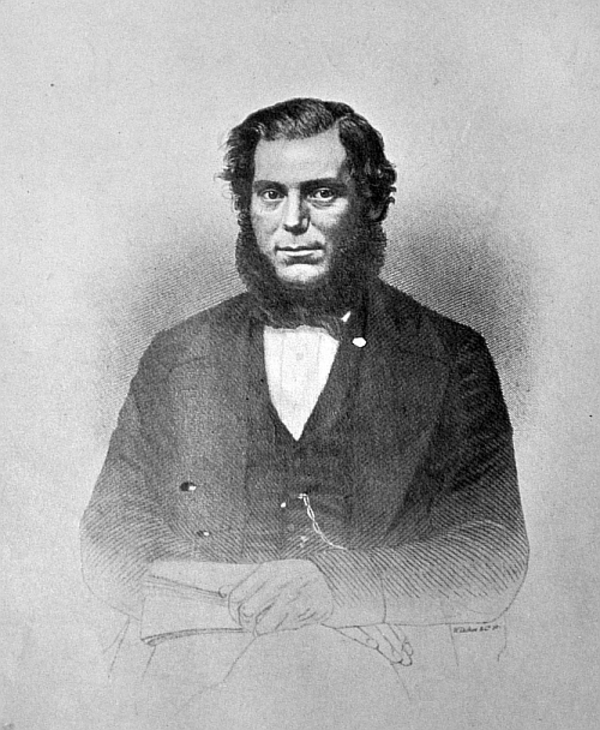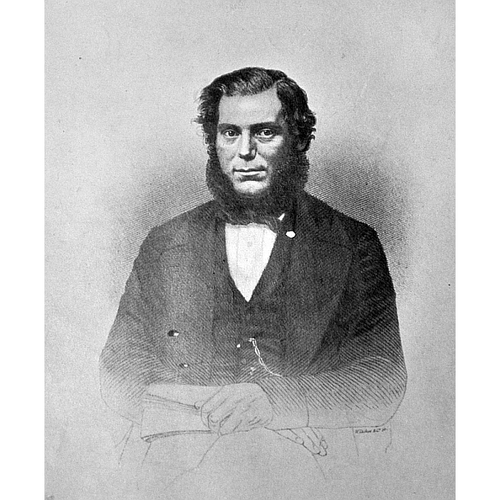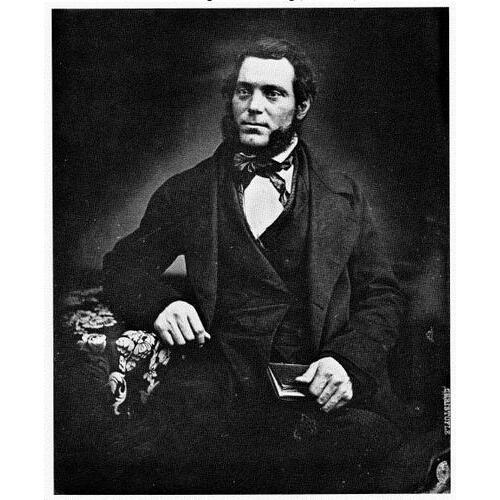
Source: Courtesy of Wikimedia Commons
MIERTSCHING, JOHANN AUGUST, Moravian missionary to the Eskimos and Arctic explorer; b. 21 Aug. 1817 at Groeditz, Saxony, son of Johann Miertsching and Erdmuth Naacké; m. in 1856 C. A. Erxleben; d. 30 March 1875 at Kleinwelke, Saxony.
Born of German working-class parents, Johann August Miertsching was sent as a boy to the Moravian community at Kleinwelke, Saxony, where he became a shoemaker and eventually joined the Moravian Church. One of the oldest Protestant sects in Europe, the Moravians had established their headquarters at Herrnhut in eastern Germany in the 18th century after fleeing from persecution in Bohemia. The evangelical impulse to convert the Eskimos led them first to Greenland in 1733, then to Labrador in 1771. Miertsching was called to the service of the mission to the Eskimos in 1844 and spent the following five years at the Okak mission station on the northern Labrador coast. Here he learned the Eskimo language and gained experience in Arctic travel.
In 1849 the British Admiralty asked the Moravian Mission Board for the services of a Labrador or Greenland missionary to join the expedition then being fitted out to search for Sir John Franklin*. Miertsching, in Saxony on furlough at the time, accepted the assignment and joined hms Investigator (Capt. Robert McClure) just before she sailed from Plymouth on 20 Jan. 1850. Sailing around Cape Horn, Investigator entered the Arctic seas from the Pacific, attempting to search out a northwest passage. Johann Miertsching and most of the crew did finally make their way across the Arctic and home to England, but only after enduring four Arctic winters and leaving Investigator and a rescue ship abandoned in the ice.
During this gruelling experience Miertsching kept a journal, which was published in abbreviated form in 1855 and translated into English and published in full in 1967. The journal is rich in topographical detail and in descriptions of the Eskimos tribes encountered, and relates in dramatic fashion the perils from ice and cold. Several times Miertsching, attired in native Eskimo dress, acted as the captain’s “invaluable interpreter,” drawing on the English he had learned in daily study sessions aboard ship. On more than one occasion, when the natives were armed and threatening, he took command of the situation, calmed the Eskimos by assurances in their own language, and left them as friends. He found that the Eskimos of the western Arctic were similar to those in Labrador in their features, dress, language, and tools. Through his efforts much valuable information was gained about the geography of the region, although, unfortunately, no trace of Sir John Franklin was found.
Miertsching preached to the Eskimos whenever possible, defended his religion to Captain McClure and other sceptics on Investigator, and made several converts among the ship’s crew. He entered wholeheartedly into the sledge journeys and hunting expeditions that became the daily round of life in the Arctic winters. Through it all he regarded and recorded shipboard life with an observant and not unhumorous eye. Describing the “school” held aboard the ice-bound ship he remarks: “It is interesting to see a polar school some of the bearded scholars writing on paper, others on a blackboard, others forming letters; some mending their clothes, while others in a half-reclining posture smoke their pipes of tobacco and play the silent spectator.”
After this epic journey Miertsching never returned to Canada. Following his marriage in Saxony, he became a missionary to the Hottentots of South Africa, serving at the mission stations of Elim and Genadendal, east of Capetown. He retired to Kleinwelke in 1868 and died there. His daughter Marie married another Labrador missionary, Hermann Theodor Jannasch*, with whom she spent 24 years working on the Labrador coast. Descendants have settled permanently in Canada.
Johann Miertsching was in many ways a typical Moravian missionary – quiet, candid, and possessed of a deep religious faith. When he was seconded to the Arctic expedition he rose to the occasion, and, under exacting conditions, carried out his duties conscientiously and ably, leaving the mark of his personality on the whole of the ship’s company.
[McClure], Discovery of the north-west passage (Osborn). [J. A. Miertsching], Frozen ships: the Arctic diary of Johann Miertsching, 1850–1854, ed. and trans. by L. H. Neatby (Toronto, 1967); Reise-Tagebuch des Missionars Joh. A. Miertsching welcher als Dolmetscher die Nordpol-Expedition zur Aufsuchung Sir John Franklins auf dem Schiffe Investigator begleitete ([Gnadau], 1855; Gnadau, Leipzig, 1856). Periodical accounts relating to the missions of the Church of the United Brethren, established among the heathen (London), 1846–75. Daniel Benham, Sketch of the life of Jan August Miertsching, interpreter of the Esquimaux language to the Arctic expedition on board H.M.S. “Investigator,” Captain M’Clure, 1850, 1851, 1852;, 1853 (London, 1854). H. W. Jannasch, “Grossvater Miertsching,” Herrnhuter Miniaturen (Lüneburg, 1953), 80–96.
Cite This Article
William H. Whiteley, “MIERTSCHING, JOHANN AUGUST,” in Dictionary of Canadian Biography, vol. 10, University of Toronto/Université Laval, 2003–, accessed December 30, 2025, https://www.biographi.ca/en/bio/miertsching_johann_august_10E.html.
The citation above shows the format for footnotes and endnotes according to the Chicago manual of style (16th edition). Information to be used in other citation formats:
| Permalink: | https://www.biographi.ca/en/bio/miertsching_johann_august_10E.html |
| Author of Article: | William H. Whiteley |
| Title of Article: | MIERTSCHING, JOHANN AUGUST |
| Publication Name: | Dictionary of Canadian Biography, vol. 10 |
| Publisher: | University of Toronto/Université Laval |
| Year of publication: | 1972 |
| Year of revision: | 1972 |
| Access Date: | December 30, 2025 |




